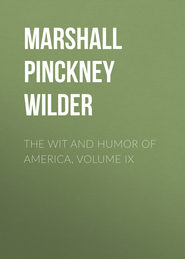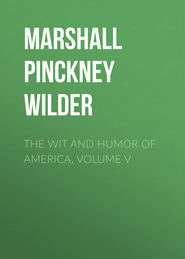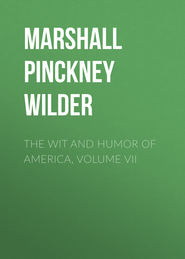По всем вопросам обращайтесь на: info@litportal.ru
(©) 2003-2024.
✖
The Wit and Humor of America, Volume VI
Автор
Год написания книги
2019
Настройки чтения
Размер шрифта
Высота строк
Поля
Then Brown he read a paper, and he reconstructed there,
From those same bones, an animal that was extremely rare;
And Jones then asked the Chair for a suspension of the rules,
Till he could prove that those same bones was one of his lost mules.
Then Brown he smiled a bitter smile and said he was at fault,
It seemed he had been trespassing on Jones's family vault;
He was a most sarcastic man, this quiet Mr. Brown,
And on several occasions he had cleaned out the town.
Now, I hold it is not decent for a scientific gent
To say another is an ass—at least, to all intent;
Nor should the individual who happens to be meant
Reply by heaving rocks at him to any great extent.
Then Abner Dean of Angel's raised a point of order, when
A chunk of old red sandstone took him in the abdomen,
And he smiled a kind of sickly smile, and curled up on the floor,
And the subsequent proceedings interested him no more.
For, in less time than I write it, every member did engage
In a warfare with the remnants of a palæozoic age;
And the way they heaved those fossils in their anger was a sin,
Till the skull of an old mammoth caved the head of Thompson in.
And this is all I have to say of these improper games,
For I live at Table Mountain, and my name is Truthful James;
And I've told, in simple language, what I know about the row
That broke up our society upon the Stanislow.
LOST CHORDS
BY EUGENE FIELD
One autumn eve, when soft the breeze
Came sweeping through the lattice wide,
I sat me down at organ side
And poured my soul upon the keys.
It was, perhaps by heaven's design,
That from my half unconscious touch,
There swept a passing chord of such
Sweet harmony, it seemed divine.
In one soft tone it seemed to say
The sweetest words I ever heard,
Then like a truant forest bird,
It soared from me to heaven away.
Last eve, I sat at window whence
I sought the spot where erst had stood
A cord—a cord of hick'ry wood,
Piled up against the back yard fence.
Four dollars cost me it that day,
Four dollars earned by sweat of brow,
Where was the cord of hick'ry now?
The thieves had gobbled it away!
Ah! who can ever count the cost,
Of treasures which were once our own,
Yet now, like childhood dreams are flown,
Those cords that are forever lost.
THOUGHTS FER THE DISCURAGED FARMER
BY JAMES WHITCOMB RILEY
The summer winds is sniffin' round the bloomin' locus' trees;
And the clover in the pastur is a big day fer the bees,
And they been a-swiggin' honey, above board and on the sly,
Tel they stutter in theyr buzzin' and stagger as they fly.
The flicker on the fence-rail 'pears to jest spit on his wings
And roll up his feathers, by the sassy way he sings;
And the hoss-fly is a-whettin'-up his forelegs fer biz,
And the off-mare is a-switchin' all of her tale they is.
You can hear the blackbirds jawin' as they foller up the plow—
Oh, theyr bound to git theyr brekfast, and theyr not a-carin' how;
So they quarrel in the furries, and they quarrel on the wing—
But theyr peaceabler in pot-pies than any other thing:
And it's when I git my shotgun drawed up in stiddy rest,
She's as full of tribbelation as a yeller-jacket's nest;
And a few shots before dinner, when the sun's a-shinin' right,
Seems to kindo'-sorto' sharpen up a feller's appetite!
They's been a heap o' rain, but the sun's out to-day,
And the clouds of the wet spell is all cleared away,
And the woods is all the greener, and the grass is greener still;
It may rain again to-morry, but I don't think it will.
Some says the crops is ruined, and the corn's drownded out,
And propha-sy the wheat will be a failure, without doubt;
But the kind Providence that has never failed us yet,
Will be on hands onc't more at the 'leventh hour, I bet!
Does the medder-lark complane, as he swims high and dry
Through the waves of the wind and the blue of the sky?
Does the quail set up and whissel in a disappinted way,
Er hang his head in silunce, and sorrow all the day?
Is the chipmuck's health a-failin'?—Does he walk, er does he run?
From those same bones, an animal that was extremely rare;
And Jones then asked the Chair for a suspension of the rules,
Till he could prove that those same bones was one of his lost mules.
Then Brown he smiled a bitter smile and said he was at fault,
It seemed he had been trespassing on Jones's family vault;
He was a most sarcastic man, this quiet Mr. Brown,
And on several occasions he had cleaned out the town.
Now, I hold it is not decent for a scientific gent
To say another is an ass—at least, to all intent;
Nor should the individual who happens to be meant
Reply by heaving rocks at him to any great extent.
Then Abner Dean of Angel's raised a point of order, when
A chunk of old red sandstone took him in the abdomen,
And he smiled a kind of sickly smile, and curled up on the floor,
And the subsequent proceedings interested him no more.
For, in less time than I write it, every member did engage
In a warfare with the remnants of a palæozoic age;
And the way they heaved those fossils in their anger was a sin,
Till the skull of an old mammoth caved the head of Thompson in.
And this is all I have to say of these improper games,
For I live at Table Mountain, and my name is Truthful James;
And I've told, in simple language, what I know about the row
That broke up our society upon the Stanislow.
LOST CHORDS
BY EUGENE FIELD
One autumn eve, when soft the breeze
Came sweeping through the lattice wide,
I sat me down at organ side
And poured my soul upon the keys.
It was, perhaps by heaven's design,
That from my half unconscious touch,
There swept a passing chord of such
Sweet harmony, it seemed divine.
In one soft tone it seemed to say
The sweetest words I ever heard,
Then like a truant forest bird,
It soared from me to heaven away.
Last eve, I sat at window whence
I sought the spot where erst had stood
A cord—a cord of hick'ry wood,
Piled up against the back yard fence.
Four dollars cost me it that day,
Four dollars earned by sweat of brow,
Where was the cord of hick'ry now?
The thieves had gobbled it away!
Ah! who can ever count the cost,
Of treasures which were once our own,
Yet now, like childhood dreams are flown,
Those cords that are forever lost.
THOUGHTS FER THE DISCURAGED FARMER
BY JAMES WHITCOMB RILEY
The summer winds is sniffin' round the bloomin' locus' trees;
And the clover in the pastur is a big day fer the bees,
And they been a-swiggin' honey, above board and on the sly,
Tel they stutter in theyr buzzin' and stagger as they fly.
The flicker on the fence-rail 'pears to jest spit on his wings
And roll up his feathers, by the sassy way he sings;
And the hoss-fly is a-whettin'-up his forelegs fer biz,
And the off-mare is a-switchin' all of her tale they is.
You can hear the blackbirds jawin' as they foller up the plow—
Oh, theyr bound to git theyr brekfast, and theyr not a-carin' how;
So they quarrel in the furries, and they quarrel on the wing—
But theyr peaceabler in pot-pies than any other thing:
And it's when I git my shotgun drawed up in stiddy rest,
She's as full of tribbelation as a yeller-jacket's nest;
And a few shots before dinner, when the sun's a-shinin' right,
Seems to kindo'-sorto' sharpen up a feller's appetite!
They's been a heap o' rain, but the sun's out to-day,
And the clouds of the wet spell is all cleared away,
And the woods is all the greener, and the grass is greener still;
It may rain again to-morry, but I don't think it will.
Some says the crops is ruined, and the corn's drownded out,
And propha-sy the wheat will be a failure, without doubt;
But the kind Providence that has never failed us yet,
Will be on hands onc't more at the 'leventh hour, I bet!
Does the medder-lark complane, as he swims high and dry
Through the waves of the wind and the blue of the sky?
Does the quail set up and whissel in a disappinted way,
Er hang his head in silunce, and sorrow all the day?
Is the chipmuck's health a-failin'?—Does he walk, er does he run?








